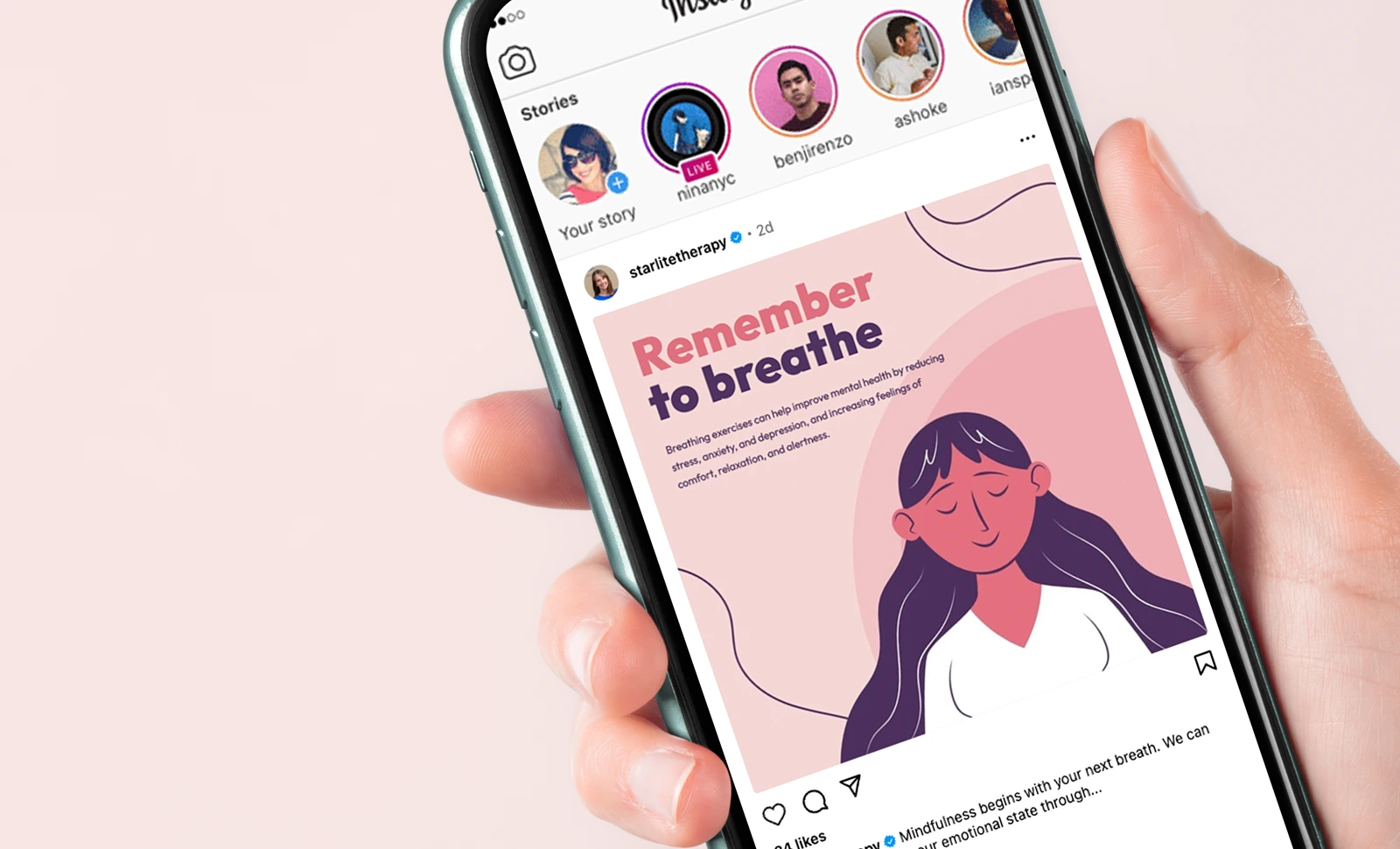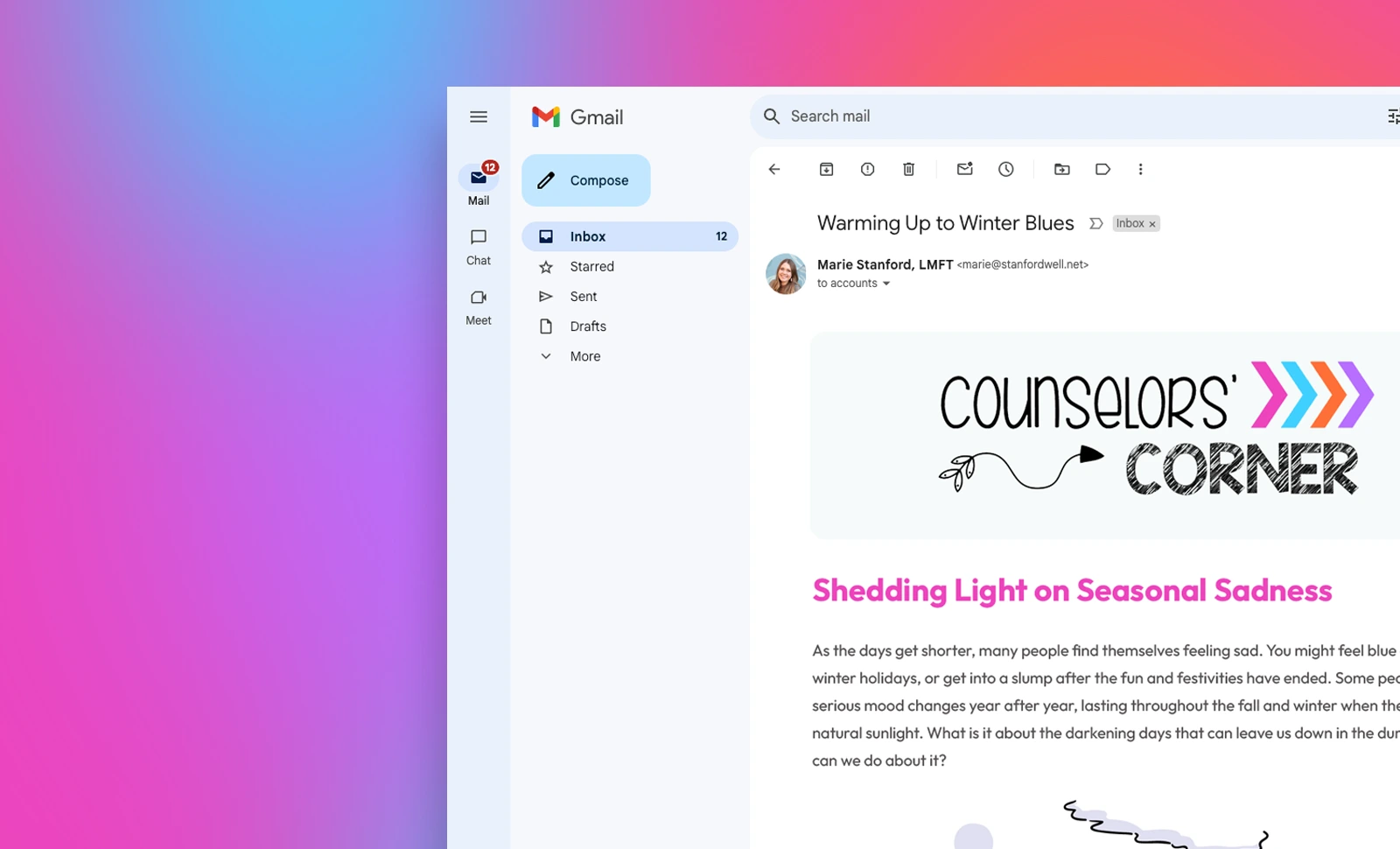As a therapist, you want clients to know, like and trust you. As a business owner, you want a steady stream of online traffic. This comprehensive guide on Psychotherapy Online Marketing was created to help you attract more clients and grow your practice.
Why Psychotherapists Need Online Marketing
Ever wonder why your therapy practice isn’t getting noticed? You offer services that people in your area need—yet there’s little to no traffic on your website. Today, a strong online presence is crucial for any therapist. After all, you are an entrepreneur and you are running a small business like any other.
Most people spend a lot of time online (perhaps too much). If your practice isn’t visible there, you’re missing the attention of potential clients. Your web presence helps attract new clients, build trust, and create a professional image. This is as true for psychotherapy online marketing as it is for restaurants and flower shops.
Today, we’ll explore the key components of psychotherapy online marketing that can make a BIG difference (SEO, social media and content marketing).
Search Engine Optimization (“SEO”), ensures your website appears when people search for therapy services. Social media lets you connect with potential clients and demonstrate expertise on the subjects you specialize in. Content marketing is about creating useful information that speaks to your audience (and search engines).
Online marketing is an easy way to connect with more potential clients and grow your private practice on autopilot. Let’s dive in and learn more!

Building a Professional Website
Perhaps we’re biased but a professional website is the cornerstone of your online marketing efforts. It’s the first impression potential clients get, so it’s gotta be impactful. Whether traffic originates from Facebook ads, Google search, therapist directories, or bus stop billboards—all roads lead to your website. Here’s what you need to nail it:
- Clean Design
Keep things simple and visually appealing. A cluttered site can overwhelm visitors. - Easy Navigation
Make sure visitors can find what they’re looking for quickly. Clear menus and logical page structures help a whole lot. - Mobile Responsiveness
Your site should look great on ALL devices. More than half of your visitors are browsing on a smartphone, so this element is crucial.
Essential Pages
You need the basics (and not much more):
- Home
Welcome your visitors and convince them to stay by showing you understand their problem. - About Me
Share your background, education, approach and treatment philosophy. - Specialties
Detail what you offer and highlight your specialties. - Blog
Share valuable content to engage and inform new and existing clients alike. - Contact
Make it super easy for people to reach you or book an consultation.
Having these elements in place ensures your website is functional, informative and build to convert. It should reflect your brand and provide real value to potential clients.
Regular updates and maintenance are also key. An outdated site can turn people away. An effective website will feel like a living, breathing extension of your practice. Keep your content fresh and ensure everything works smoothly. This shows you’re active in your business and invested in your craft.
A well-built website does more than just look pretty. It helps build trust, showcase your expertise, and create real connections with the clients who need your services.

Understanding SEO Basics
SEO, or Search Engine Optimization, is crucial for making your website more visible. If you want potential clients to find you without having to pay for every click, nailing SEO is a must. Let’s break down the basics.
First, you need to get your keywords right. Think about what your clients might type into a search engine when looking for therapy services. Use those terms throughout your website—not the ones you learned in school.
Next, think about on-page SEO elements such as:
- Meta Descriptions
Summarize your page content in a way that makes people want to click. - Title Tags
Make sure each page has a unique, descriptive title with keywords. - Internal and External Links
Link to relevant content within your site and other trusted sites. - High-Quality Content
Write blogs and articles that provide value while targeting your chosen keywords. For more insights on creating effective content, check out our SEO strategies tailored for therapists.
Off-page SEO is equally important. This involves:
- Backlinking
When possible, get other reputable sites to link to your content. - Social Media Engagement
Share your content on social platforms to drive traffic back to your site. - Forum Participation
Engage in forums, groups and communities related to mental health and therapy.
Don’t forget about technical SEO. Ensure your site loads quickly, is secure, and works well on all devices. A clean site structure helps search engines understand and rank your content better.
Long-term, good SEO practices lead to more organic traffic and greater credibility. It’s a marathon, not a sprint—but the benefits are well worth it!
Creating Valuable Content
Maybe you’ve heard the cliché, “content is king” but it couldn’t be more true in psychotherapy online marketing. Your audience wants valuable, engaging content that speaks to their needs. What types of content could you create?
Mix it up! There are plenty of ways to put your expertise out into the world:
- Blog Posts
Share insights on anxiety, depression, relationship advice, and self-care tips. - Videos
Create short clips explaining therapeutic techniques or answering common questions. - Podcasts
Discuss mental health topics, interview other professionals, or share client success stories (with permission). - Infographics
Visuals on coping strategies, mindfulness exercises, or mental health statistics.
Each format offers a different way to resonate with your audience.
Lead with value. Don’t be afraid to give away advice for free. 80% of your content should be educational and 20% can be promotional. This keeps your audience engaged without feeling like you’re always selling them.
Creating valuable content isn’t just about filling up your website. It’s about connecting with your audience, building trust, and showcasing your approach. For a deeper understanding of how to build a professional web presence for your practice, you can schedule a 15-minute demo tour with our team.

Leveraging Social Media
Social media is a game-changer for mental health professionals. It allows you to connect with your audience, build your brand, and establish trust. Plus, it’s a great way to give people a sense of what it’s like working with you.
Think of social media as a way for potential clients to be a fly on your office wall and really get to know you.
Why social media is perfect for therapists:
- Increase Brand Presence
Make your practice known. Platforms like Instagram and TikTok are great for younger audiences, while LinkedIn suits corporate counseling—and Facebook is… whatever Facebook is. - Engage with People
Share behind-the-scenes looks, (anonymous) client testimonials, and valuable tools & info. Facebook, Twitter, and Instagram are perfect for this. - Build Trust and Credibility
Consistent, valuable posts build a loyal following. Responding to comments and messages shows you’re approachable, trustworthy and friendly.
Choosing the right platforms is key. You don’t need to spread yourself thin on every platform. It’s better to crush it on one social network vs OK on five of them.
Tailor your content for each platform. Instagram is visual, LinkedIn is professional, and Facebook is a free-for-all. Keep a consistent posting schedule. This shows you’re active and committed, which builds trust.
Social media isn’t just a fun way to waste an afternoon. It’s a powerful marketing tool to grow your practice and connect with clients in a meaningful way (on their turf).
Optimizing for Local SEO
Optimizing for local SEO helps you attract clients right in your neighborhood. This begins with creating and optimizing your Google My Business account.
Verify your business to ensure it’s legit. Google will send you a postcard or call you with a verification code. Enter that code and you’re good to go.
Next, update your profile with all the relevant info:
- Business Name
Use your practice name as it appears on your website. - Address and Phone Number
Make sure these match exactly with what’s on your site. - Business Hours
Keep them current (update for holidays and vacations). - Services
List all the services you offer and include a description of each. - Photos
Add high-quality images of you and your office.
Clients leaving positive reviews on Google is pure gold. Positive reviews build credibility and improve your ranking in local & map searches. This can be especially tricky in the mental health space but softly encourage it when the vibe feels right.
Use local keywords in the content on your website. Think about what terms people in your area might use to find therapy services. Include the name of your city, neighborhood and state in your blog posts, service descriptions, and even in your meta descriptions.
Online reviews can significantly impact your practice. Positive reviews boost your credibility and attract more clients. Engage with both positive and negative reviews professionally. Thank clients for positive feedback. Address negative feedback promptly and constructively. This shows your commitment to client satisfaction.
Local SEO drives more traffic to your site from people nearby. It’s all about making it easy for locals to find and trust your practice. If you’re looking for inspiration on how to engage with the community and build a strong professional network, consider reading about our experience at the Lowcountry MH Conference, where we showcased our services to over 1,500 mental health professionals.

Effective Email Marketing
Email marketing is a reliable way to engage with potential and current clients. Let’s touch on some strategies that can make a big difference.
First, choose an email service provider. Platforms like Mailchimp or Mailerlite are great for collecting and sending emails to your subscribers. They offer tools to manage your email list and automate your campaigns.
Next, create a lead magnet. Offer something valuable for free, like a helpful checklist, eBook, or worksheet in exchange for an email address. This incentivizes users to join your list.
When crafting your emails, make sure they align with your brand voice and offer real value. This is the same brand voice you utilize in your social media and website content.
Use a landing page for lead magnet downloads. This helps automate the process and ensures a smooth user experience. When users download your lead magnet, their details get stored in your email service provider.
Maintaining an email list allows for direct communication with your audience. It’s a personal way to keep them informed and engaged with your practice. Some will take the free inbox therapy and some will become clients over time. As with all marketing, it’s numbers game!
Paid Advertising for Therapists
Unlike organic SEO, paid advertising can provide immediate results for your practice. Platforms like Google, Facebook, Instagram, YouTube, and LinkedIn allow you to target specific audiences based on keywords, interests, and demographics.
- Immediate Leads
Paid ads can drive traffic to your site quickly. You will start getting clicks as soon as the ads are approved. - Targeted Advertising
Use keyword targeting on Google Ads to reach people searching for specific services. On social media, you can target audiences based on their interests, demographics and online behavior. - Remarketing
Create campaigns to re-engage visitors who have been to your site but didn’t book a consultation. This keeps your practice top-of-mind and increases the chance of conversion. For obvious reasons, remarketing can be a touchy subject in the privacy world. - Monitor and Adjust
Regularly check your ad performance. Make adjustments based on what’s working to get the best return on investment. Pay-per-click advertising is not a “set it and forget it” effort.
Ethical considerations are crucial in paid advertising, especially for private practices. Make sure your ads are don’t imply knowledge of the visitor’s mental health or medical conditions.
Paid advertising can be a powerful tool to quickly grow your practice, attract new clients, and build your personal brand. Just remember to keep it ethical and always focus on providing real value.
Tracking Your Marketing Efforts
Tracking your marketing efforts is essential for making informed decisions and optimizing your strategies. Use tools like Google Analytics to monitor your campaigns and see what’s working. This is why all Session Sites websites include a detailed analytics dashboard.
First, keep an eye on key metrics to give you a clear picture of your website’s performance:
- Website Traffic
See how many people visit your site and where they came from. More traffic means more potential clients! - Bounce Rate
Check the percentage of visitors who leave quickly without exploring other pages. A high bounce rate usually means your site needs improvements. - Conversion Rate
Track how many visitors take action, like booking an appointment or signing up for your newsletter. This shows how effective your site is at turning clicks into clients.
Analytics help you see the big picture and fine-tune your marketing efforts. Use them to make data-driven decisions and keep improving your online presence.
Key Takeaways
Building an effective online presence is crucial for growing your private practice. Let’s recap the key takeaways from our psychotherapy online marketing guide:
- Professional Website
A clean, easy-to-navigate, and mobile-responsive website is the cornerstone of online success. - SEO Basics
Keywords, meta descriptions, title tags, and high-quality content are your best friends. Don’t forget about backlinks, social media engagement, and technical SEO for the best results. - Valuable Content
Mix up your content with blogs, videos, podcasts, and infographics. Follow the 80:20 rule to keep your audience engaged without feeling overwhelmed by promotions. - Social Media
Use social networks like Instagram, LinkedIn, and Facebook to increase your brand presence, engage with your audience, and build trust. Focus on quality over quantity! - Local SEO
Optimize your Google My Business profile and use local keywords to attract clients in your state. Positive reviews can significantly boost your credibility. - Ethical Marketing
Be transparent, respectful, and true to your values. Avoid manipulative tactics and use trauma-informed language to maintain trust and credibility. - Continuous Monitoring
Use tools like Google Analytics to track your efforts. Monitor website traffic, bounce rate, and conversion rate to make data-driven adjustments.
Bookmark this post and implement these psychotherapy online marketing strategies to enhance your online presence and attract more clients. Keep your marketing efforts ethical and client-focused for long-term success. Don’t be overwhelmed. Take it one piece at a time. You got this!

